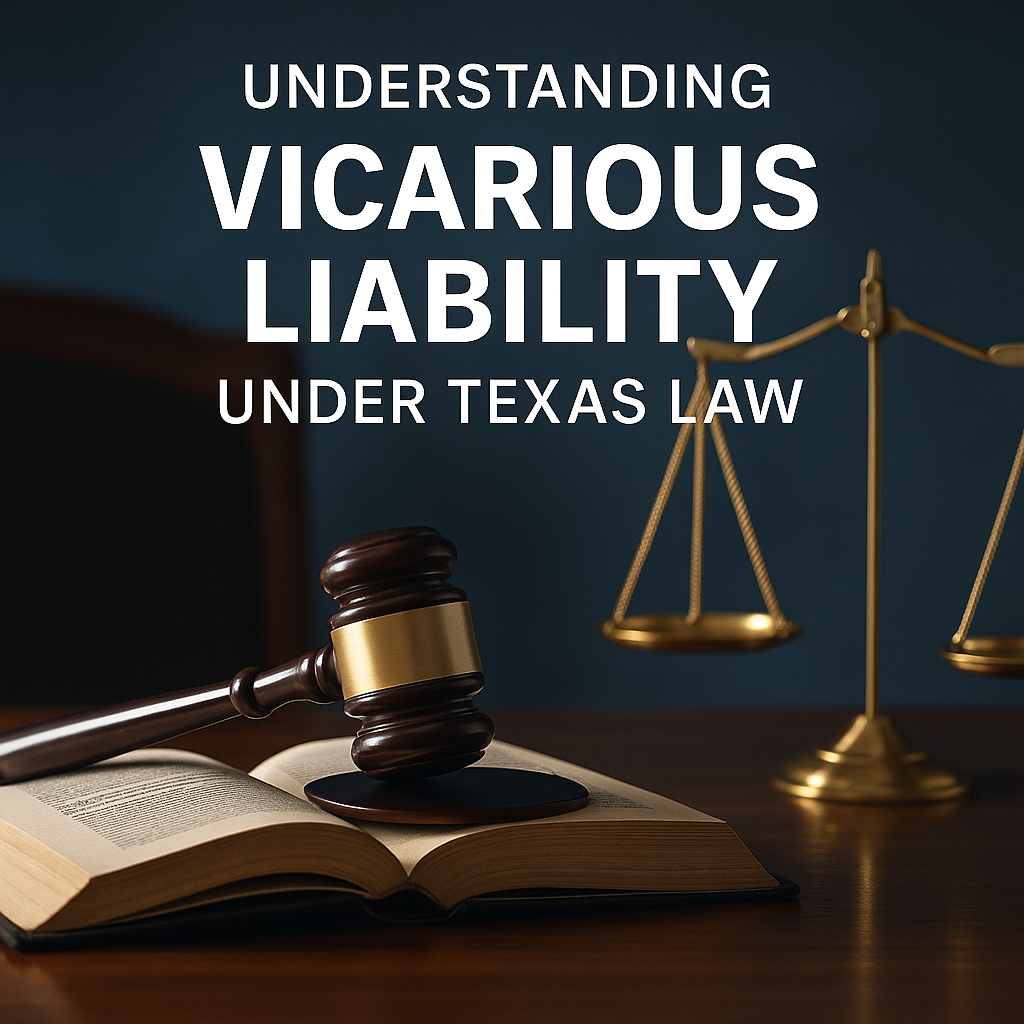
In Texas, the concept of vicarious liability holds one person or entity legally responsible for the wrongful acts of another. It’s an important doctrine in both civil and employment law—especially in cases involving employers, employees, and business operations.
What Is Vicarious Liability?
Vicarious liability—sometimes called “imputed liability” or “respondeat superior”—is a legal principle where one party is liable for the torts (wrongful acts) committed by another, even if the liable party did not personally commit the act.
The most common example is the employer-employee relationship. If an employee negligently causes injury to someone while performing job duties, the employer can often be held liable for the employee’s conduct.
The “Course and Scope of Employment” Test
Under Texas law, the key inquiry is whether the employee’s wrongful act occurred within the course and scope of employment. Courts examine whether:
- The employee was performing duties assigned by the employer or engaged in conduct subject to the employer’s control; and
- The act was undertaken, at least in part, to serve the employer’s business.
If both are true, the employer may be vicariously liable—even if the employee acted negligently or made poor decisions.
However, if the employee acted for personal reasonsor was “on a frolic of his own” (a legal phrase meaning a purely personal detour), the employer typically escapes liability.
Independent Contractors vs. Employees
Texas law generally distinguishes between employees and independent contractors. Employers are usually not vicariously liable for the actions of independent contractors, since they do not exercise the same degree of control over their work.
That said, exceptions exist. For example, vicarious liability can still arise if:
- The employer retains control over the contractor’s work;
- The work involves inherently dangerous activities; or
- The employer was negligent in hiring, supervising, or retaining the contractor.
Common Scenarios in Texas Law
- Car Accidents by Employees: If an employee causes a wreck while making a work-related delivery, the employer may be liable.
- Company-Owned Vehicles: Liability can attach when an employee uses a company car for business purposes.
- Professional Services: In law firms, hospitals, and other professional settings, an organization may bear responsibility for its agents’ acts.
Intentional Torts
Vicarious liability is less common for intentional torts like assault, fraud, or defamation—but not impossible. If the act was closely tied to job duties (e.g., a bouncer using excessive force), Texas courts may still impose liability on the employer.
Why It Matters
For businesses and employers, understanding vicarious liability is critical for risk management. Having clear employment policies, proper training, and adequate insurance coverage can mitigate exposure.
For plaintiffs, establishing vicarious liability ensures that a financially responsible party—usually the employer—is available to compensate for injuries or losses.
Final Thoughts
Vicarious liability embodies the principle that those who benefit from others’ work should also bear the burden of their mistakes. Under Texas law, it’s a powerful tool for ensuring accountability, but its application depends heavily on the facts of each case.
If you’re facing a dispute involving employer or agency responsibility, it’s wise to consult a Texas attorney who understands both the nuances of tort law and the realities of business operations.
At David C. Barsalou, Attorney at Law, PLLC, we help clients navigate business, family, tax, estate planning, and real estate matters ranging from document drafting to litigation with clarity and confidence. If you’d like guidance on your situation, schedule a consultation today. Call us at (713) 397-4678, email barsalou.law@gmail.com, or reach us through our Contact Page. We’re here to help you take the next step.